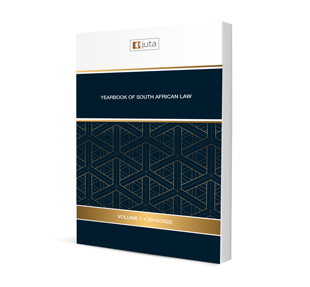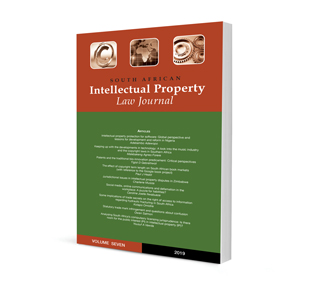Index of Statutes and Cases 2020

Index of Statutes and Cases 2020
ISSN: 2710-0677
Source: Yearbook of South African Law, Volume 1
Index
TBC

ISSN: 2710-0677
Source: Yearbook of South African Law, Volume 1
TBC

ISSN: 2521-2591
Affiliations: Professor of Mercantile Law, University of Johannesburg
Source: South African Intellectual Property Law Journal, 2020, p. 1 – 12
A name that is a geographical designation may at times acquire a secondary meaning, indicating the origin of goods or services. With regard to retail services it is well established, in South Africa and Europe that they qualify for protection – the essence being the bringing together, for the sake of convenience goods for purchase by the public. However, a particular problem has arisen in relation to shopping complexes. Whilst European, but also British, law has protected such marks, they have also come under attack. The basis for the latter, in brief, is that the names of the complexes have become landmarks or acquired primarily a geographical significance. In Britain for instance protection was not granted to the mark canary wharf, as it, amongst others, was the name of a political ward. The marks in other words no longer function as trade marks. This issue came to a head in the judgment in the Century City case. In this matter the trade marks of a retail establishment were attacked on the ground that they have come to relate more to a place name than a trade mark. Having regard to the need for tenants to describe their businesses whilst using the name, the principal marks were expunged. In applying the case to developments such as Sandton City, possible discerning factors are investigated. One might be single ownership of the complex. Another interesting question is the impact of the situation where there is a pre-existing suburb, with the same name as the complex, versus where the complex is built later on.

ISSN: 2521-2591
Affiliations: Postdoctoral Research Fellow, University of Cape Town
Source: South African Intellectual Property Law Journal, 2020, p. 13 – 34
Corporate interests have dictated globalised protection and enforcement of intellectual property rights (IPRs). Corporations have not only controlled IPRs as exclusive private properties, gotten IPRs strengthened as trade-related in the World Trade Organisation’s Trade-Related Aspects of Intellectual Property Rights (TRIPS), but have also laid property-based human rights protection claims to IPRs. While IPRs controlled by businesses have largely enhanced shareholder value, they have also engendered corporate abuses with negative impacts on competing interests of other corporate stakeholders, including the employees, contractors and consumers. This paper interrogates the extent to which such stakeholders are (or can be) protected within the IP law and corporate law framework. It provides specific instances of corporate abuses of IPRs, highlighting attendant injuries to relevant stakeholder interests. Following the identification of a few remedies available within the IP law system, the paper examines not only current possible safeguards at corporate law but also proposes new and complementary roles corporate law may play towards the protection of victim stakeholders from asocial control of IPRs using the corporate form.


ISSN: 2521-2591
Affiliations: Laurea (Trento), LLM (London), PhD (Wits)
Source: South African Intellectual Property Law Journal, 2020, p. 35 – 55
Indisputably, technology and innovation play a crucial role in promoting development and the betterment of people’s lives. However, access to technology is often hindered by proprietary claims from private corporations who are its major rights holders. Over the years, the efforts to facilitate access and transfer of technology for the states in need, especially the least developed countries (LDCs), have been frustrated by the lack of adequate international legal frameworks. The provisions of arts 7 and 66.2 of the TRIPS agreement that have attempted to set a basic regime to promote the transfer of technology for the benefit of LDCs has failed to ignite the necessary flows of technology. Accordingly, this paper recommends two approaches to promote technology transfer for the benefit of LDCs, especially in Africa, which are: the improvement of the provisions of the TRIPS agreement related to technology transfer and/or the establishment of a unified legally binding international instrument – the Agreement on Trade Related Issues of Technology Transfer.

ISSN: 2521-2591
Affiliations: Attorney of the High Court of South Africa
Source: South African Intellectual Property Law Journal, 2020, p. 56 – 79
This work offers a comparative evaluation of the South African and European Union (EU) copyright protection of databases. The work also considers how the originality standard in the Copyright Amendment Bill is likely to affect the copyright protection of databases in South Africa. The work also considers the intersection between the protection of databases and competition and the interface between the protection of databases and the exercise of certain constitutional rights in both jurisdictions. The main conclusion of the work is that the South African copyright standard for protecting databases is too low and should be revised to accommodate certain competition law concerns and the exercise of certain constitutional rights.